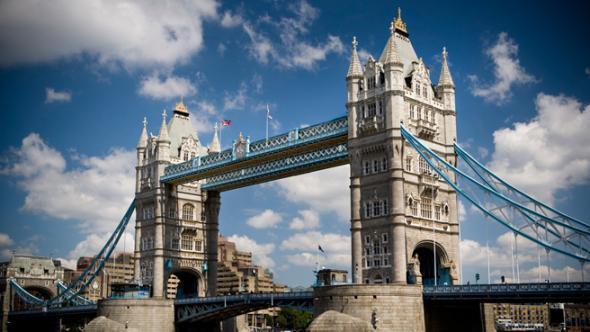British Overseas Territories

Postwar 20th century
Main articles: Postwar Britain (1945–1979) and Social history of Postwar Britain (1945–1979)
Map of the world. Canada, the eastern United States, countries in East Africa, India, most of Australasia and some other countries are highlighted in pink.
Map showing territories that were at one time part of the British Empire, with the United Kingdom and its current British Overseas Territories and Crown Dependencies underlined in red
During the Second World War, the UK was one of the Big Three powers (along with the U.S. and the Soviet Union) who met to plan the post-war world;[124][125] it was an original signatory to the Declaration by United Nations. After the war, the UK became one of the five permanent members of the United Nations Security Council and worked closely with the United States to establish the IMF, World Bank and NATO.[126][127] The war left the UK severely weakened and financially dependent on the Marshall Plan,[128] but it was spared the total war that devastated eastern Europe.[129] In the immediate post-war years, the Labour government initiated a radi
cal programme of reforms, which had a significant effect on British society in the following decades.[130] Major industries and public utilities were nationalised, a welfare state was established, and a comprehensive, publicly funded healthcare system, the National Health Service, was created.[131] The rise of nationalism in the colonies coincided with Britain’s now much-diminished economic position, so that a policy of decolonisation was unavoidable. Independence was granted to India and Pakistan in 1947.[132] Over the next three decades, most colonies of the British Empire gained their independence, with all those that sought independence supported by the UK, during both the transition period and afterwards. Many became members of the Commonwealth of Nations.[133]
The UK was the third country to develop a nuclear weapons arsenal (with its first atomic bomb test in 1952), but the new post-war limits of Britain’s international role were illustrated by the Suez Crisis of 1956. The international spread of the English language ensured the continuing international influence of its literature and culture.[134][135] As a result of a shortage of workers in the 1950s, the government encouraged immigration from Commonwealth countries. In the following decades, the UK became a more multi-ethnic society than before.[136] Despite rising living standards in the late 1950s and 1960s, the UK’s economic performance was less successful than many of its main competitors such as France, West Germany and Japan.
